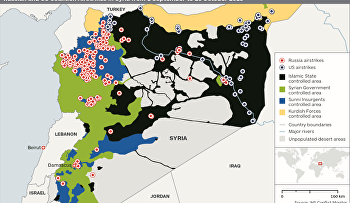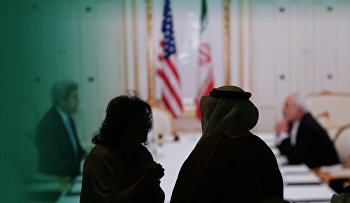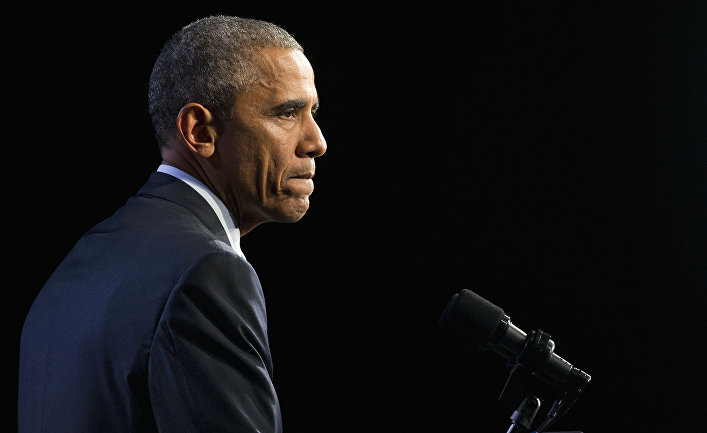President Barack Obama took the decision to send a special squad of 50 men to Syria, to carry out military training locally – aimed at annihilating ISIL. The American president has similarly deployed 3500 military instructors to Iraq.
President Obama has always based his diplomatic and defense strategy on the policy of withdrawing American troops from Iraq and Afghanistan. Despite this, when Russia began its air strikes in late September in support of Syrian President Bashar al-Assad, the US president was compelled to review his strategy. Republican Senator John McCain blasted Obama's actions, calling them insufficient. Many experts comment that Obama has no actual strategy at all. Sending 50 men at this stage is too little, too late. One's driven to conclude that Obama's response to President Putin's operations is merely an attempt to create an alibi.
US to send military advisers to help fight #ISIS in Syria, breaking Obama's no-boots pledge https://t.co/KqttLzNfJ7 pic.twitter.com/ykE0qVdYoT
— China Xinhua News (@XHNews) October 30, 2015
The steps Obama has taken will damage his future reputation, whilst having little chance of improving his standing with the public now. The situation in Syria is now following Putin's agenda. President Assad will remain in power, while the US and Russia, along with pro-Sunni Saudi Arabia and Turkey, and pro-Shiite Iran will establish the road-map for a peaceful settlement, for the destruction of ISIL, and for stabilizing the region.
A month on from Russia's intervention
It's now been a month since Russia's President Putin began launching air attacks in Syria. The company “Jane's Information Group" has compiled a map of the American and Russian bombing campaigns.

The area shown in black on the map is the territory controlled by ISIL. The dark-blue area is under the control of Sunni opposition forces, and the green area is that controlled by President Assad. If you look at the red circles – Russian air strikes – you quickly see that these Russian air attacks are concentrated on regions under Sunni opposition control. The senior analyst at “Jane's” comments on the map as follows:
- By increasing their assistance to Syria, Russia and Iran are primarily supporting the power of the Assad administration.
- The principle rationale of the Russian bombing isn't aimed at destroying ISIL. The Russian air raids are intended to improve the situation in Damascus, Homs, Hama and Aleppo – locations which are under President Assad's control.
- The map of air strikes shows that the Russians and Americans in the coalition are pursuing different agendas.
- Russia will begin deploying main air strikes on ISIL positions only when peace talks are possible, or when the Sunni opposition come to the negotiating table – and with President Assad's positions guaranteed.
There are two exceptions in the Russian logic, however. Russia will attack ISIL in order to prevent the possibility that the Aleppo Air Base could fall into the hands of terrorists. Russia is also bombing Palmyra, which is similarly being attacked by ISIL militants.
The weakening Assad administration
Russia and Iran have intensified their aid to Syria, while Assad himself is finding it hard to support his own governmental army. Assad is dependent on the Alawite minority population. If the civil war drags on further, the support Assad can expect from the Alawites will flag. Such a scenario would see the Sunnis gaining strength, since they represent the majority population of the country. The Jane's Information Group analyst commented that “I believe that both Russia and Iran will be pressuring Assad to make peace with the Sunni side.”
On 30 October in Vienna a meeting was held between the foreign ministers of the US, Russia, Britain, Germany, France, Saudi Arabia, Turkey, Iran, Iraq, Qatar, Jordan, and other nations. The US, along with other western nations, Saudi Arabia and Turkey demand that Bashar al-Assad stand down. Russia and Iran oppose this — and the gulf between the two groups on this issue cannot be bridged.

Putin's successful tactics
In one way or another, President Putin's strategy combination of military and diplomatic action is getting results. (1) Syria is managing to retain its position as a major nation in the Middle East, (2) in the international arena Russia is holding its own against the USA (3) Russia's military power is clearly established, and (4) the preconditions are solidifying for an end to the sanctions imposed on Russia by western countries over the Ukrainian crisis. Such are the goals of Russia's leader. By contrast with President Obama, is taking a proactive and demonstrative lead.
On 20 and 22 October, announcements were made of the imminent completion of a permanent Russian military base in the Arctic Ocean on the Lomonosov Ridge – an area rich in natural resources. Russia is building three further military Arctic bases. Troops will be based at these bases no later than 2018.
On 22 October Russia announced the construction of military bases on the Kuril Islands, including the “northern territories.”
On 22 October, Members of Parliament representing the pro-Russian faction in the Moldovan Parliament proposed a no-confidence motion regarding Moldova's present pro-Western government.
On 23 October, the Defense Ministry of Belarus, in one step, rejected proposals that Russia would establish an Air Force base in Belarus – but in a parallel step demanded that effective measures be taken to stem NATO expansion in Poland.
On 23 October, the Russian Foreign Ministry announced joint measures with Jordan for correcting the bombing target zones in Syria.
On 23 October the Russian Foreign Minister required that the American Secretary of State and the Egyptian Foreign Minister admit Egypt and Iran to the Syrian peace talks.
On 26 October the Montenegran Prime-Minister criticized Russia, claiming that Russia had somehow organized anti-government demonstrations in his country.
On 27 October Russian arms manufacturers announced their readiness to supply helicopters for Egyptian aircraft carriers, if they were required. (Egypt has been publicly mentioned as a possible purchaser of the Mistral aircraft carriers, which France no longer plans to sell to Russia – WTSAUSA)
If anti-government forces begin to expand their activities in Afghanistan, Russia has said it is ready to play its part in border patrols between Afghanistan and Tajikistan. One cannot monitor the Syrian crisis in isolation. President Putin is changing the balance of power. He looks askance at President Obama, whose influence is waning. Putin's tough diplomacy and military strategy causes jitters for countries who were formerly under Soviet influence — and who now consider the possibility that they might end up in the hands of the Russian leader.






